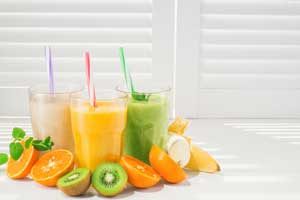
The FSSAI has already notified the Food Safety and Standards (Food Products Standards and Food Additives) Tenth Amendment Regulations, 2017, which in principle outlines the standards for alcoholic and non-alcoholic-carbonated beverages. However, the FSSAI has enlarged the scope of this regulation to include the emerging segment of non-carbonated non-alcoholic water-based beverages such as flavored water, herbal water etc. which are making their way into the Indian beverage market. The amendment was made after due consideration of the suggestions and objections of stakeholders. These regulations will come into force from the date of their publication in the official gazette.
These regulations feature separate general and microbiological standards for specific characteristic non-carbonated, non-alcoholic water-based beverages. They cover standards for a range of these beverages like flavored water, herbal water etc. They also outline the ingredients that are permitted for use in these beverages and many have been included so as to widen the scope of standards and encourage innovation in products. The use of caffeine and herbs is permitted but within the limits prescribed and in accordance with regulations.
In the Food Safety and Standards (Food Products Standards and Food Additives) Regulations, 2011, in the regulation relating to “BEVERAGES (Other than Dairy and Fruits & Vegetables based)” (2.10) in the category “Caffeinated beverages”, the standards for Non-carbonated Water Based Beverages (Non-Alcoholic) have been added.
Non-carbonated Water Based Beverages (Non-Alcoholic) have been defined as beverages containing water conforming to the standards prescribed for packaged drinking water under these regulations without added carbon dioxide and may contain ingredients as specified below singly or in combination.
Specified Ingredients that can be used in these beverages are sugar, liquid glucose, dextrose monohydrate, invert sugar, fructose, honey, salt and salt substitutes, fruits or flowers or vegetables and their products including extractives, herbs, spices and their derivatives and permitted flavoring, singly or in combination. Non-carbonated water may contain caffeine not exceeding 145 parts per million from whatever sources it may be derived in the formulation of the product:
Added herbs must comply with safety requirements as specified in the Food Safety and Standards Act, 2006 and the regulations made thereunder, and shall also be declared on the label.
Food Additives: For products covered under this standard, specific food additives permitted in Appendix A may be used within the limits specified.
Hygiene: The products shall conform to the microbiological requirements given in Appendix B.
Labeling: The products shall comply with the packaging and labeling requirements as laid down under the provision of the Food Safety and Standards (Packaging and Labelling) Regulations, 2011.
Through a Note, the FSSAI has stated that
Data of toxicological analysis is to be provided for its approval for those herbs which have not been specified in the Food Safety and Standards (Health Supplements, Nutraceuticals, Food for Special Dietary Use, Food for Special Medical Purpose, Functional Food and Novel Food) Regulations, 2016, and in these regulations if they are to be added to the beverages.
The beverages must not contain the psychotropic substance, as defined in the Schedule to the Narcotic Drugs and Psychotropic Substances Act, 1985 (61 of 1985) and the rules made thereunder, and substances listed in Schedules E and E1 of the Drugs and Cosmetics Rules, 1945, shall be included.’;
Microbiological Requirements for Non-Carbonated Water Based beverages have been given in the new Table 7 which has been added to this regulation and which is as follows:-
| Sl. No | Parameter | Limits |
| 1. | Total plate count per ml | Not more than 50 CFU per ml. |
| 2. | Yeast and mould count per ml | Not more than 2 CFU per ml |
| 3. | Coliform count | Absent in 100 ml. |
All Non-carbonated beverages shall be free from pathogens.
Leave a Reply